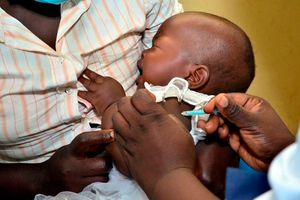How used car tyres are fuelling spread of malaria, dengue fever in Mombasa

Workers in Mombasa collect used tyres, the most common breeding site for the Aedesaegypti mosquito species that causes dengue fever. The tyres were later bought for 75 Kenyan shillings each and transported to recycling centres, officials said.
To combat malaria in Mombasa County, the local administration launched an initiative to eliminate mosquito breeding sites.
After months of research, the operation revealed that 18 per cent of the county's top mosquito breeding sites were used car tyres.
What's more, more than half of the tyres were harbouring mosquito larvae, making them a major contributor to the spread of malaria.
To tackle the problem, officials focused their efforts on larviciding - a method of controlling mosquito populations by eliminating their breeding grounds.
This method involves regularly treating potential breeding sites to prevent the development of mosquito larvae.
It is hoped that this will significantly reduce the spread of malaria and improve the health of the local population.
Officials say the tyres have long been the perfect breeding ground for the Aedes aegypti mosquito, which is responsible for the rising cases of dengue fever in the region.
County officials also note that the removal of the tyres has inadvertently reduced the incidence of dengue fever and promoted environmental improvements.
"Fieldworkers located and treated water bodies suitable for mosquito breeding, aided by a designated mobile app developed by ZzappMalaria, an Israeli startup," county officials said, adding the research was conducted in collaboration with ZzappMalaria.
"Used tyres are believed to be one of the primary means by which Aedes mosquitoes – and the diseases they carry, primarily dengue - have been spreading globally. This prompted an adaptive strategy that included removing these tyres rather than their repetitive treatment," Paul Hollwedel, the Chief Operating Officer at ZzappMalaria, explained.
Sh75 each
"Fieldworkers reported the locations of used tyres, which were later purchased for Sh75 each and transported to recycling centres. This removal process, which totalled 2,200 tyres, integrated community engagement by educating tyre owners on the importance of selling or regularly tilting their tyres to prevent water accumulation," he added.
County officials agree that, despite the additional costs, this initiative has proved to be highly cost-effective.
They believe that the removal of tyres, especially from areas close to homes, significantly reduces potential breeding grounds for mosquitoes, which has a significant impact on public health and the environment. Mr Hollwedel highlighted the efficiency and cost benefits of tyre removal over continuous spraying.
"During the operation—the results of which will be presented at the upcoming 6th Multi-Sectoral Working Group of the RBM Partnership to End Malaria in Kigali, Rwanda –a significant finding was that 18 per cent of the water bodies that were detected were located in used tyres, with over half of these tyres harbouring mosquito larvae."
Emphasising its sustainability
He underscored this approach's effectiveness, emphasising its sustainability compared to other methods.
"By removing the tyres, we know that the effects of our operation will last even after the operation is over."
Arnon Houri-Yafin, CEO of ZzappMalaria, agrees with him.
"This is a prime example of One Health."
"By fighting one disease, we are succeeding in reducing the morbidity of another disease. It's a win-win situation for all parties involved: the municipality achieved long-lasting results while cutting costs, owners of used tyres and the recycling company both made a good profit and most importantly, the citizens of Mombasa now enjoy healthier and cleaner neighbourhoods," he told Nation.Africa.
Dengue is a viral infection that is transmitted from mosquitoes to humans.
It is more common in tropical and subtropical climates, according to the World Health Organization.
Most people who get dengue have no symptoms.
But for those who do, the most common symptoms are high fever, headache, body aches, nausea and rash.
Most people get better in 1-2 weeks. Some people develop severe dengue and need hospital care.
The World Health Organization says that most cases of dengue fever can be treated at home with painkillers.
"Preventing mosquito bites is the best way to avoid getting dengue. There is no specific treatment for dengue. The focus is on treating pain symptoms," WHO notes.
The health body adds that paracetamol is often used to control pain.
"Non-steroidal anti-inflammatory drugs like ibuprofen and aspirin are avoided as they can increase the risk of bleeding. There is a vaccine called Dengvaxia for people who have had dengue at least once and live where the disease is common," WHO experts say, adding that for people with severe dengue, hospitalisation is often needed.
Major dengue outbreak
According to the Mombasa County Department of Health, there has been a major dengue outbreak.
The first was reported in early March 2021, with 24 out of 47 cases testing positive (51 per cent positivity rate).
In April of the same year, a further 305 out of 315 cases tested positive (97 per cent positivity rate).
Neighbouring Lamu County also reported 224 positive cases from various health facilities, of which 59 were children under five.
A total of 553 cases were reported in January, February, March and April 2021, with a peak in April.
However, no deaths have been reported in the two counties.
Officials in both counties warned that more cases are expected as the seasonal long rains continue until the end of May, boosting mosquito populations.





